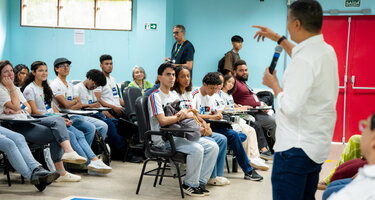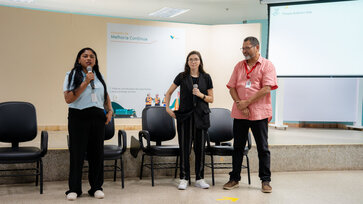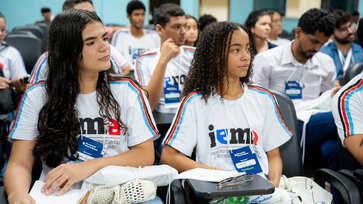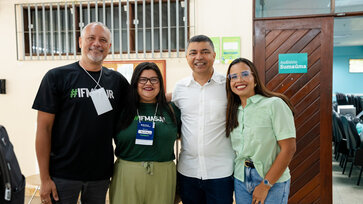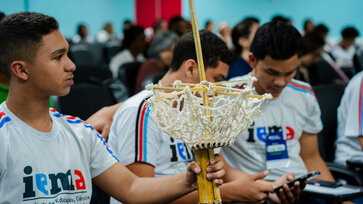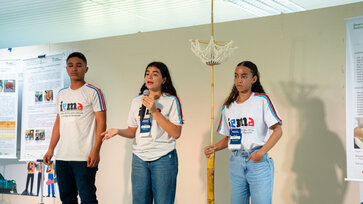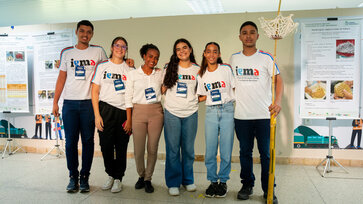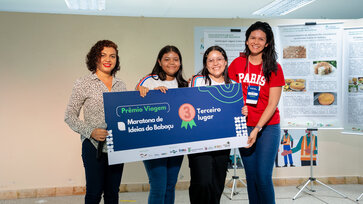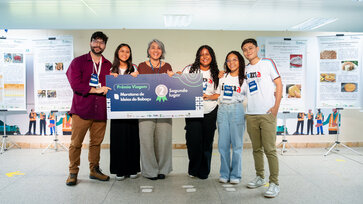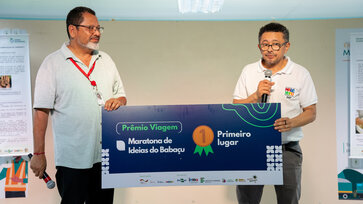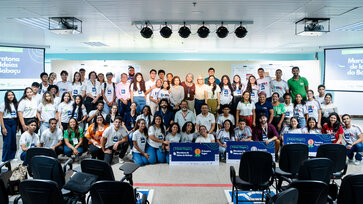Advancing Innovation: Maranhão Hosts First Babassu Ideas Marathon
In early March 2025, the city of São Luís, Maranhão, became the stage for a remarkable and inspiring event: the 1st Babassu Ideas Marathon—a dynamic, non-digital “ideathon” created to foster creative and practical solutions to real-world challenges faced by babassu coconut breakers and their community enterprises.
Held on 13–14 March at the Vale Botanical Park, the in-person event brought together over 70 participants, including students and teachers from public educational institutes, expert mentors, judges, organisers and invited partners. This initiative was not an isolated activity, but part of a wider strategy to engage young people with the babassu value chain. These activities were developed within the Social Innovation Technical Working Group, first introduced during the "Diálogos do Babaçu" (Babassu Dialogues)—an event aimed at strengthening collaboration among public authorities, businesses, research and educational institutions, and community associations involved in the babassu sector across Maranhão.
This report presents an experience-based overview of the planning and execution of the Babassu Ideas Marathon. Its purpose is to consolidate the methodology adopted by the organising committee and present the structured steps that led to the event’s success. It is worth noting that the in-person event was just one part of a broader process. Prior to the event itself, considerable efforts were made around mobilisation and communication, ensuring strong engagement and effective outcomes.
What is Babassu?
Babassu (Attalea speciosa) is a native palm tree found in the Amazon and Cerrado regions of Brazil, particularly in the state of Maranhão. Its coconut-like fruit contains valuable oil-rich kernels used for cooking, cosmetics, soaps, and traditional medicine.
The tree is at the heart of the livelihoods of thousands of rural women known as quebradeiras de coco (coconut breakers), who collect, crack, and process the fruits. Babassu is not only an economic resource, but also a symbol of cultural identity and resistance for these women and their communities.
The sustainable use of babassu plays an important role in local economies, biodiversity conservation, and the fight for land and resource rights in traditional territories.
A Marathon of Ideas Without a Single Computer
Unlike traditional hackathons that often rely on computers and software development, the Babassu Ideas Marathon focused on hands-on, community-centred innovation, inviting students to create low-tech, high-impact solutions. A total of 35 teams, representing more than 1,000 high school students (Years 10 to 12) from nine public and federal educational institutes across Maranhão, registered for the marathon. From these, the top 10 teams (54 students in total) were selected to participate in the final two-day event.
The event awarded three outstanding solutions:
1st winner: 🥇 Babassu Warriors Team (IFMA Monte Castelo)
- Challenge met: safely collecting green babassu coconuts directly from the palm tree, improving both functionality and safety for the women engaged in this task.
2nd winner: 🥈 Babassu Solar Greenhouse Team (IEMA Itaqui Bacanga)
- Challenge met: drying the babassu mesocarp using a solar-powered greenhouse. The team presented a working prototype already under development
3rd winner: 🥉 Babassu Entrepreneurs Team (IEMA Itaqui Bacanga)
Challenge met: financial management. They created a simple, easy-to-use notebook to help track income and expenses from babassu product sales.
Innovation Meets the Field
As a prize, the three winning teams embarked on a special field trip at the end of May to visit three key community enterprises in the babassu chain, all located in the Chapadinha micro-region. These were:
- Associação das Quebradeiras de Coco dos Projetos de Assentamento de Chapadinha, based in the Canto do Ferreira Settlement Project;
- Cooperativa Mista da Agricultura Familiar e do Extrativismo do Babaçu do Vale do Itapecuru, in Itapecuru Mirim;
- Associação Clube de Mães Quilombolas Lar de Maria, in the Pedrinhas Quilombo, Anajatuba.
During the trip, the students and their mentors had the opportunity to present their ideas directly to the coconut breakers, gather feedback, and co-develop adaptations. This immersive exchange provided valuable insights into the daily realities of community enterprises and deepened the connection between youth innovation and traditional knowledge. The group also toured agro-industrial facilities and participated in lectures led by professors from the Federal University of Maranhão (UFMA), addressing topics such as the importance of family farming and the sustainability challenges of soy cultivation in the region.
A Model for Social Innovation
The Babassu Ideas Marathon is a joint initiative of GIZ Brazil, through the AgriChains Brazil project, and the Government of Maranhão, in partnership with Embrapa Maranhão, the Federal and State Institutes of Maranhão (IFMAs and IEMAs), and the three community-based babassu enterprises.
By fostering collaboration between youth, educators, researchers, and grassroots organisations, the event exemplifies how social innovation and education can work hand in hand to address real-world problems—creating not just ideas, but meaningful, community-driven solutions for the future of the babassu value chain.
